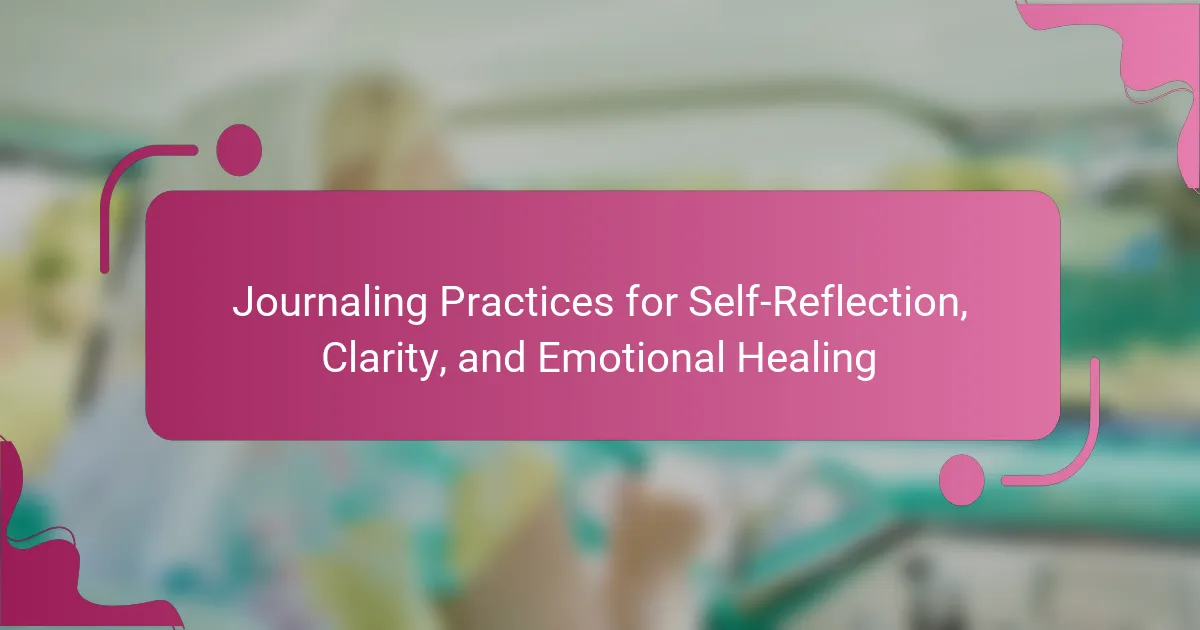Journaling practices enhance self-reflection and emotional healing by providing a structured outlet for thoughts. This article explores effective journaling techniques, including expressive writing, gratitude journaling, and guided prompts. It also discusses how to integrate journaling into daily routines and overcome common challenges. Finally, it highlights the unique benefits of journaling for clarity and personal growth.
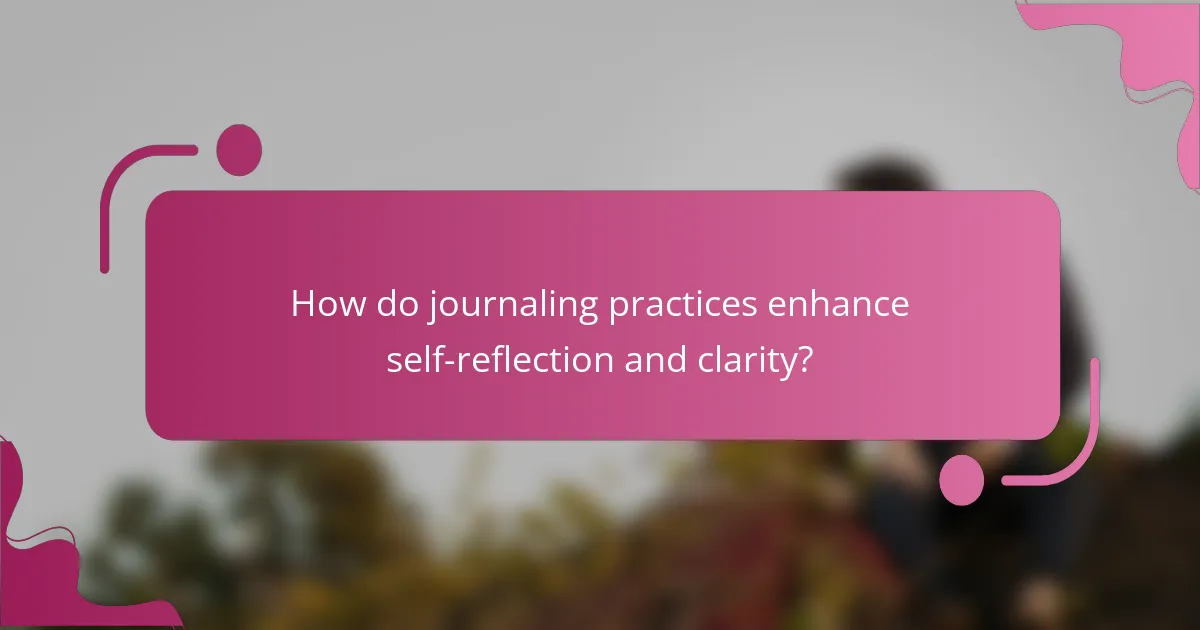
How do journaling practices enhance self-reflection and clarity?
Journaling practices significantly enhance self-reflection and clarity by providing a structured outlet for thoughts and emotions. This process fosters deeper understanding, leading to improved emotional healing and personal growth. Regular journaling encourages individuals to articulate feelings, track progress, and identify patterns in their behaviour. As a result, it cultivates a clearer mindset and promotes self-awareness. Engaging in this practice consistently can lead to transformative insights and a greater sense of purpose.
What are the psychological benefits of journaling?
Journaling offers significant psychological benefits, including enhanced self-reflection, clarity, and emotional healing. Engaging in this practice can reduce stress, improve mood, and foster a greater sense of control over one’s thoughts and feelings.
Research indicates that regular journaling can lead to improved emotional regulation, allowing individuals to process complex emotions more effectively. It provides a safe space for exploring thoughts, which can lead to insights and personal growth.
Additionally, journaling can enhance problem-solving skills. By articulating challenges on paper, individuals often find new perspectives and solutions that may not have been evident before.
Ultimately, the psychological benefits of journaling contribute to overall mental well-being, promoting resilience and a more positive outlook on life.
Which journaling techniques promote effective self-reflection?
Journaling techniques that promote effective self-reflection include free writing, prompted journaling, and gratitude journaling. These methods enhance clarity and emotional healing.
Free writing encourages unfiltered thoughts, allowing deeper insights. Prompted journaling offers specific questions that guide reflection, fostering focus on particular issues. Gratitude journaling shifts attention to positive aspects, improving emotional well-being.
Incorporating these techniques regularly can lead to significant personal growth and self-awareness.
Why is emotional clarity important in personal development?
Emotional clarity is crucial for personal development as it fosters self-awareness and decision-making. Journaling practices enhance this clarity by allowing individuals to articulate feelings and thoughts. Regular writing helps identify patterns, leading to deeper insights and emotional healing. This process supports personal growth, enabling individuals to navigate challenges with resilience.
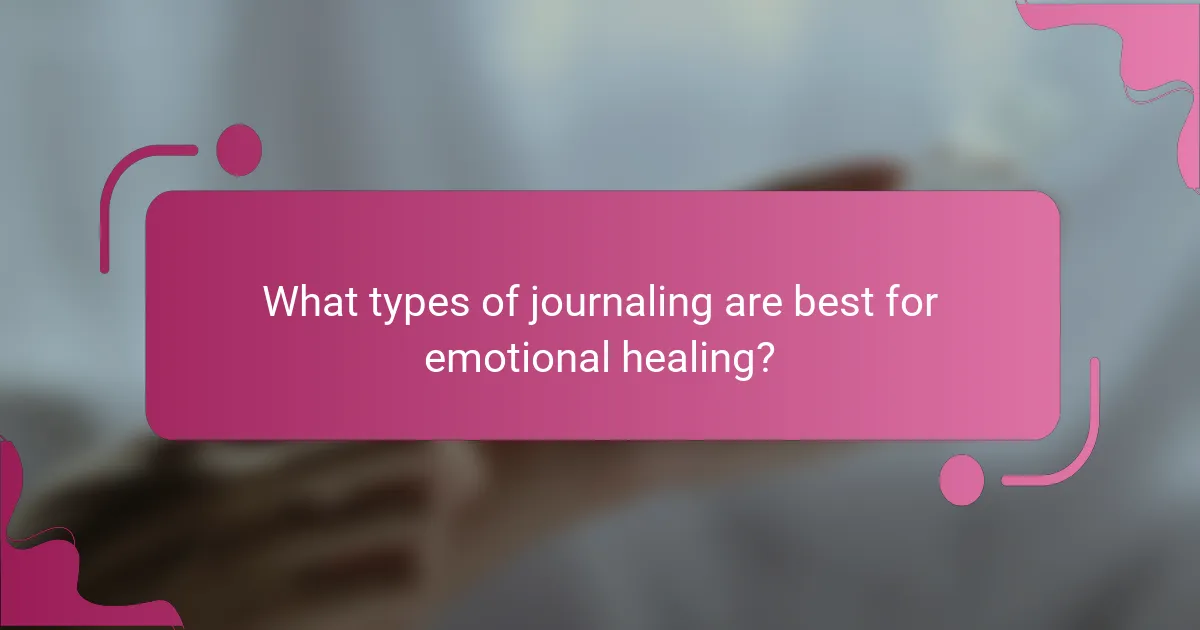
What types of journaling are best for emotional healing?
Journaling practices that are best for emotional healing include expressive writing, gratitude journaling, and guided prompts. Expressive writing allows individuals to process emotions by freely writing about their thoughts and feelings. Gratitude journaling focuses on recognizing and appreciating positive aspects of life, which can enhance overall well-being. Guided prompts offer structured questions that encourage deeper self-reflection and insight. Each of these practices fosters clarity and emotional release, contributing to healing.
How does expressive writing differ from traditional journaling?
Expressive writing focuses on emotional exploration, while traditional journaling emphasizes daily events and reflections. Expressive writing encourages deeper self-discovery through free-form expression, often addressing trauma and feelings. Traditional journaling typically follows a structured format, documenting experiences and thoughts. Both practices promote emotional healing, but their approaches differ significantly in intent and style.
Which prompts can facilitate emotional exploration?
Journaling prompts that encourage emotional exploration include reflective questions, creative writing exercises, and guided imagery. These prompts help individuals delve into their feelings and thoughts, fostering clarity and healing.
1. What emotions am I experiencing right now?
2. Describe a recent experience that triggered strong feelings.
3. Write a letter to your past self or future self.
4. What are three things I am grateful for today?
5. How do I cope with stress and anxiety?
6. What does self-care mean to me?
Using these prompts can enhance self-awareness and promote emotional healing through journaling practices.
What role does gratitude journaling play in emotional well-being?
Gratitude journaling significantly enhances emotional well-being by fostering positive thinking and reducing stress. It encourages individuals to focus on the good in their lives, which can lead to increased happiness and life satisfaction. Studies show that regularly writing about things one is grateful for can improve overall mental health. This practice also cultivates resilience, helping individuals cope better with adversity. By reflecting on positive experiences, gratitude journaling can shift perspectives and promote a more optimistic outlook on life.
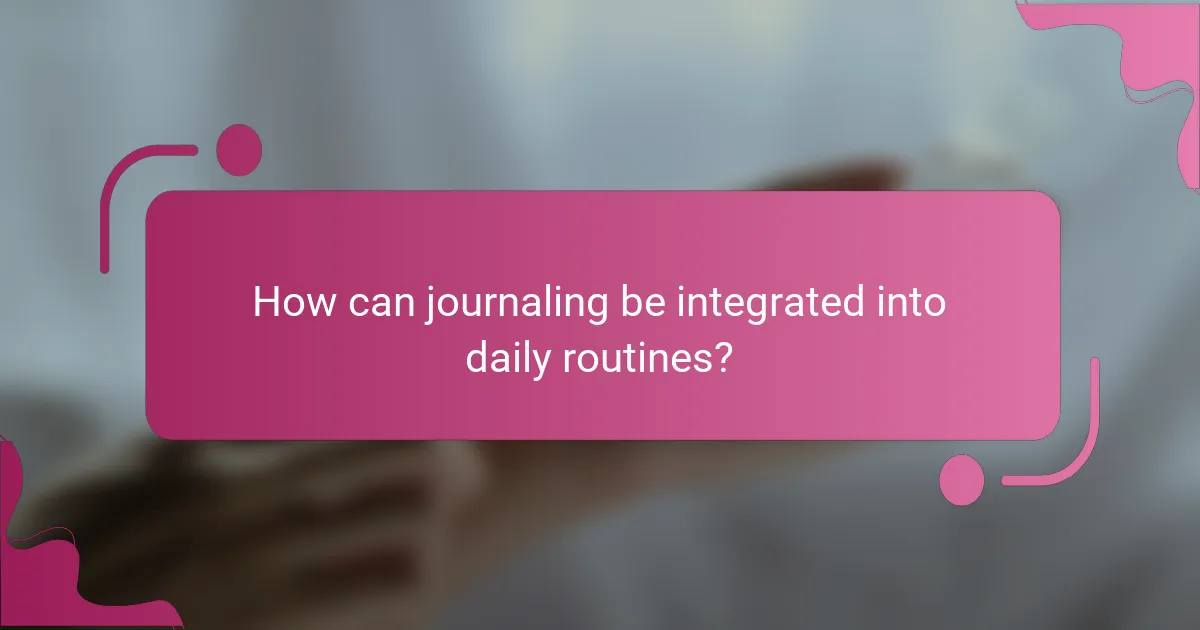
How can journaling be integrated into daily routines?
Integrating journaling into daily routines enhances self-reflection, clarity, and emotional healing. Start by setting aside a specific time each day, such as morning or evening, to write. Consistency fosters habit formation and deepens insights.
Begin with prompts to guide your thoughts. These can include questions about daily experiences, emotions, or goals. This approach encourages focused reflection and clarity.
Consider varying the format of your journaling. Use bullet points for lists, free writing for stream-of-consciousness thoughts, or structured entries for specific themes. This diversity keeps the practice engaging and tailored to your needs.
Finally, create a comfortable environment for journaling. Choose a quiet space with minimal distractions. This setting promotes emotional healing and allows for deeper introspection.
What are effective strategies for consistent journaling?
Consistent journaling requires establishing a routine, setting clear intentions, and creating a conducive environment. Start by selecting a specific time each day to write, making it a non-negotiable part of your schedule. Define your journaling goals, whether for self-reflection, clarity, or emotional healing. This focus will guide your entries and enhance their effectiveness. Lastly, choose a comfortable space that inspires creativity and minimizes distractions, allowing for deeper reflection and emotional processing.
How does journaling influence mindfulness practices?
Journaling enhances mindfulness practices by fostering self-awareness and emotional clarity. It allows individuals to process thoughts, reduce stress, and cultivate a deeper understanding of their emotions. Regular journaling can lead to improved mental health and resilience. Engaging in this practice encourages reflection, which is essential for mindfulness. Studies show that expressive writing can significantly lower anxiety levels and promote emotional healing.
Which tools and platforms can enhance the journaling experience?
Digital tools and platforms can significantly enhance the journaling experience. Applications like Day One and Journey offer features such as multimedia integration, prompts, and cloud storage to foster self-reflection and emotional healing.
1. Day One: A versatile app with photo integration, reminders, and weather data to enrich entries.
2. Journey: Provides guided journaling prompts and a web interface for accessibility.
3. Penzu: Focuses on privacy with password protection and customizable journal templates.
4. Evernote: Allows users to organize thoughts with tagging and multimedia support.
5. Notion: Offers a flexible workspace for journaling alongside other productivity tools.
6. Google Docs: Simple, collaborative platform for sharing and editing journal entries.
These tools cater to various preferences, enhancing clarity and emotional processing through structured journaling practices.
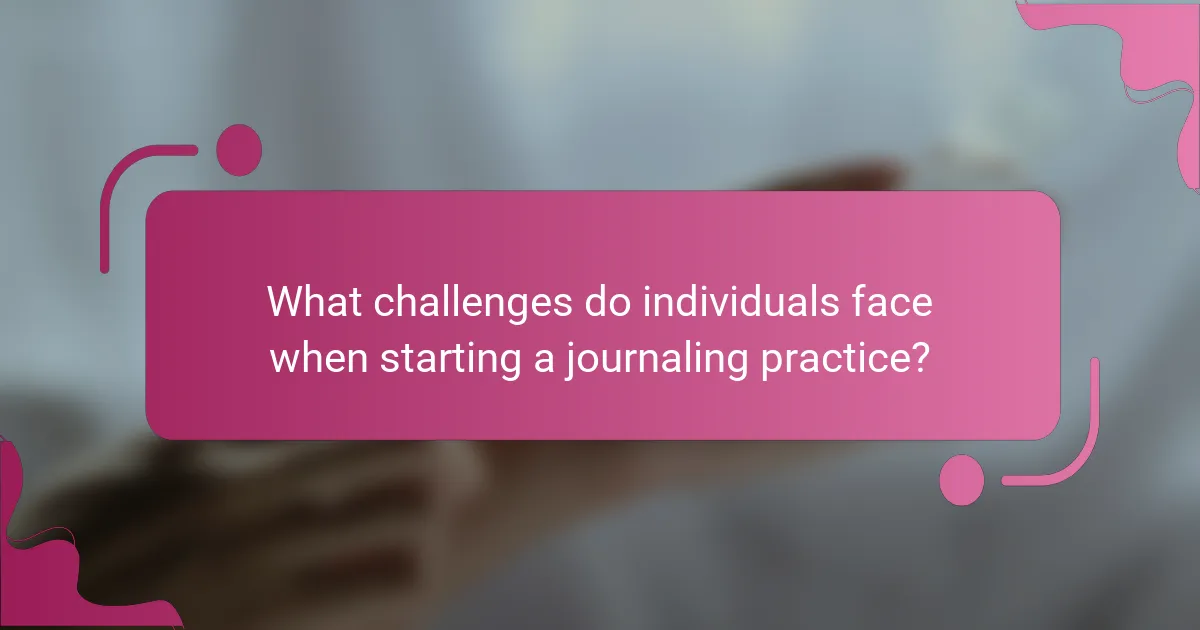
What challenges do individuals face when starting a journaling practice?
Individuals face several challenges when starting a journaling practice. Common obstacles include lack of time, uncertainty about what to write, and fear of vulnerability. Many struggle to establish a consistent routine, which can hinder emotional healing and self-reflection. Additionally, self-criticism may prevent individuals from fully engaging in the practice. Overcoming these barriers is crucial for realizing the benefits of journaling, such as clarity and emotional growth.
How can writer’s block be overcome in journaling?
To overcome writer’s block in journaling, try free writing, setting a timer, or using prompts. These techniques encourage flow and reduce pressure. Free writing allows unfiltered thoughts, while timed sessions create a sense of urgency. Prompts can inspire creativity and focus. Regular practice builds confidence and clarity.
What common misconceptions exist about journaling?
Many misconceptions about journaling suggest it is solely for writers or requires a specific format. In reality, journaling is accessible to everyone and can take various forms, such as bullet points or free writing. Another common myth is that journaling must be done daily; however, it can be beneficial even when practiced sporadically. Some believe journaling is only for emotional release, while it also promotes clarity and self-reflection. Lastly, many think that there is a “right” way to journal, but personal preferences and individual needs should guide the practice.
How can journaling be adapted for different personality types?
Journaling can be tailored for different personality types by adjusting methods and styles. Introverts may prefer private reflections, while extroverts might benefit from expressive writing.
Analytical individuals may focus on structured formats, such as bullet points or charts, while creative types may enjoy free-form writing or artistic elements. Additionally, those with high emotional sensitivity may find therapeutic prompts useful for deeper exploration.
Incorporating these adaptations enhances self-reflection, clarity, and emotional healing, making journaling a versatile tool for personal growth.

What unique attributes of journaling can enhance emotional healing?
Journaling uniquely enhances emotional healing through self-expression, reflection, and emotional processing. It allows individuals to articulate feelings, leading to greater self-awareness. Writing can serve as a therapeutic outlet, reducing stress and anxiety. The act of journaling fosters clarity, enabling users to identify patterns in their thoughts and emotions. This unique attribute of journaling as a personal narrative tool promotes resilience and emotional growth.
How does art journaling differ in impact from written journaling?
Art journaling fosters a visual and emotional connection, while written journaling emphasizes cognitive processing. Art journaling often leads to spontaneous expression, allowing feelings to surface through imagery. This can enhance emotional healing by bypassing rational barriers. In contrast, written journaling promotes clarity through structured thought and reflection. Both practices support self-reflection, but art journaling uniquely engages creativity, making it a distinct tool for emotional exploration.
Which cultural perspectives influence journaling practices?
Cultural perspectives significantly shape journaling practices, influencing techniques and purposes. Different cultures emphasize diverse aspects, such as mindfulness in Eastern traditions or self-expression in Western contexts.
For example, in Japan, reflective journaling often incorporates nature, promoting harmony and tranquility. In contrast, American practices may focus on personal growth and emotional processing.
Additionally, indigenous cultures often use journaling as a tool for storytelling and preserving history, highlighting community connections. These varied influences create a rich tapestry of journaling practices that cater to unique emotional and reflective needs.
What innovative journaling methods are emerging in 2025?
Innovative journaling methods emerging in 2025 focus on digital integration, mindfulness, and personalized prompts. These practices enhance self-reflection, clarity, and emotional healing.
One method involves using AI-driven journaling apps that analyze user entries to provide tailored feedback and prompts. This technology helps users uncover patterns in their thoughts and emotions, promoting deeper self-awareness.
Another trend is the incorporation of multimedia elements, such as audio and video, allowing users to express their feelings in various formats. This approach caters to different learning styles and enhances emotional expression.
Lastly, community-based journaling initiatives are gaining popularity. These platforms allow users to share insights and experiences, fostering a sense of connection and support among participants. This communal aspect can significantly enhance the healing process through shared experiences.

What are the best practices for maximizing the benefits of journaling?
To maximize the benefits of journaling, establish a consistent routine, set clear intentions, and create a safe space for reflection. Focus on authenticity, allowing your thoughts and feelings to flow freely. Incorporate specific prompts to guide your writing, enhancing clarity and emotional processing. Experiment with different styles, such as gratitude journaling or stream-of-consciousness writing, to discover what resonates most.
How can feedback and community enhance journaling experiences?
Feedback and community significantly enhance journaling experiences by providing support, motivation, and diverse perspectives. Engaging with others fosters accountability and encourages deeper self-reflection. Community insights can introduce new journaling techniques, enriching personal growth. Additionally, sharing experiences can validate emotions, creating a sense of belonging that promotes emotional healing.
What common mistakes should be avoided in journaling?
To enhance journaling practices, avoid common mistakes such as neglecting consistency, focusing solely on negativity, and overthinking entries. These pitfalls can hinder self-reflection and emotional healing. Additionally, refrain from using journaling as a task rather than a therapeutic tool. Embrace authenticity by writing freely without self-judgment.
Which expert tips can help improve journaling effectiveness?
To improve journaling effectiveness, establish a routine, set clear intentions, and reflect regularly. Incorporating prompts can enhance focus, while reviewing past entries fosters deeper insights. Consistency in practice leads to greater emotional clarity and healing.
